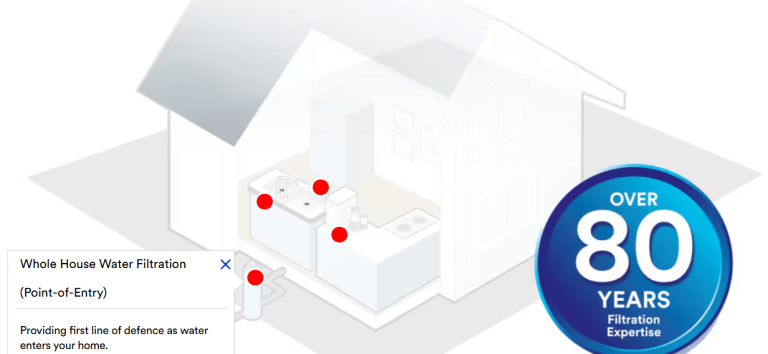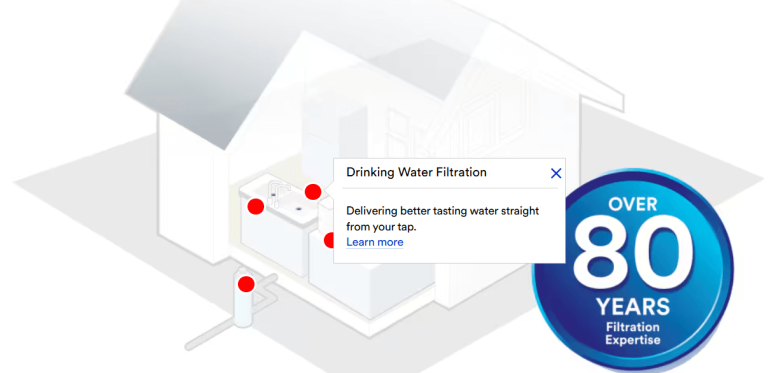Water Filtration for Health: Benefits Beyond Taste and Odor
Access to clean, safe drinking water is crucial for maintaining good health. While taste and odor are the most noticeable aspects of water quality, water filtration systems offer a myriad of health benefits that go well beyond improving these sensory factors.
Product Expert from xam max kitchen will explore the various health benefits associated with water filtration systems and why they are essential for safeguarding your well-being.
Removal of Harmful Contaminants
Water filtration systems are designed to remove a wide range of contaminants from your tap water. These contaminants may include heavy metals (e.g., lead, mercury), bacteria, viruses, chlorine, pesticides, pharmaceutical residues, and industrial pollutants.
Filtering out these contaminants can help protect you from various waterborne diseases and long-term health issues linked to exposure to toxins and pathogens.
Reduction of Chlorine and Chloramine
Municipal water treatment plants often use chlorine and chloramine to disinfect water. While necessary for killing harmful bacteria, these chemicals can have adverse health effects when consumed in high quantities.
Water filtration systems, especially activated carbon filters, can significantly reduce chlorine and chloramine levels, reducing your risk of skin irritation, respiratory problems, and the formation of disinfection byproducts.
Improved Digestive Health
Contaminated water, whether from untreated or poorly treated sources, can carry a range of harmful microorganisms, including bacteria, viruses, and parasites.
These microorganisms can pose significant health risks when ingested, primarily affecting the digestive system. Here’s a breakdown of how this process occurs:
Bacterial Contamination:
- Pathogenic Bacteria: Water sources contaminated with pathogenic bacteria like E. coli, Salmonella, Shigella, and Campylobacter can lead to digestive issues when consumed.
- Ingestion: When contaminated water is ingested, these bacteria enter the gastrointestinal tract.
Viral Contamination:
- Enteric Viruses: Enteric viruses, such as norovirus and rotavirus, are common waterborne viruses that can cause gastrointestinal infections.
- Transmission: These viruses can easily spread through water, especially in areas with poor sanitation and sewage disposal systems.
Parasitic Contamination:
- Protozoa and Helminths: Parasites like Giardia, Cryptosporidium, and Entamoeba histolytica can thrive in contaminated water.
- Infection: When ingested, these parasites can cause intestinal infections, leading to symptoms such as diarrhea, abdominal pain, and cramps.
Digestive Problems:
- Diarrhea: One of the most common symptoms resulting from waterborne microorganisms is diarrhea. The body’s natural response to the presence of harmful pathogens in the digestive tract is to increase bowel movements in an attempt to flush them out.
- Stomach Cramps: Stomach cramps often accompany diarrhea and can be caused by the irritation of the intestinal lining due to the presence of these microorganisms.
- Dehydration: Frequent diarrhea can lead to dehydration, a potentially serious complication that can result in electrolyte imbalances, weakness, and dizziness.
Long-Term Health Effects:
- Chronic Illnesses: In cases of repeated exposure to contaminated water, individuals may develop chronic gastrointestinal conditions, leading to ongoing digestive problems and nutrient absorption issues.
- Compromised Immune System: Those with compromised immune systems, such as young children, the elderly, and individuals with underlying health conditions, are particularly vulnerable to waterborne infections and their severe consequences.
Filtration systems can eliminate these pathogens, making your water safer to drink and cook with.
Protection from Heavy Metals
Some regions have elevated levels of heavy metals in their water supply due to factors like aging infrastructure or industrial pollution. Consuming water with high levels of heavy metals can lead to serious health issues, such as neurological problems, developmental delays in children, and more.
Water filtration systems equipped with specialized filters can effectively remove heavy metals, safeguarding your health and the health of your family.
Better Skin and Hair Health
Unfiltered tap water may contain hard minerals and chemicals that can be harsh on your skin and hair. Using filtered water for bathing and showering can result in softer skin, shinier hair, and a reduced risk of skin irritations.
Protecting Vulnerable Groups
Children, the elderly, and individuals with compromised immune systems are particularly susceptible to waterborne contaminants. Installing a water filtration system can provide an added layer of protection for these vulnerable groups.
Enhanced Hydration
When water tastes and smells better, you’re more likely to drink an adequate amount of it. Proper hydration is essential for overall health, including maintaining bodily functions, cognitive performance, and temperature regulation.
Conclusion
While the taste and odour of water are important factors in ensuring its drinkability, the health benefits of water filtration systems extend far beyond these sensory aspects.
By removing contaminants, reducing harmful chemicals, and improving water quality, these systems play a critical role in safeguarding your health and the well-being of your loved ones.
Investing in a high-quality water filtration system can be a wise decision to ensure that you have access to safe and healthy drinking water at home.







